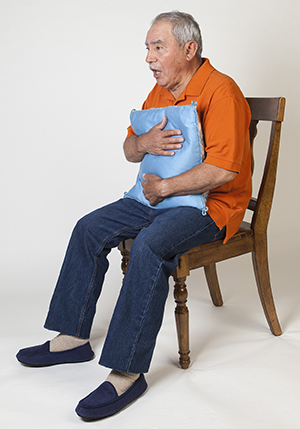Deep Coughing
Deep coughing helps keep your lungs clear. If you’ve had surgery, this will help you get better faster. Deep coughing also helps you breathe easier and may prevent a lung infection or other complications. Follow these steps to do deep coughing.

Step 1
-
Sit on the edge of a bed or a chair. You can also lie on your back with your knees slightly bent.
-
Lean forward slightly.
-
If you've had surgery on your chest or stomach, hold a pillow or rolled-up towel firmly against your cut (incision) with both hands. Hug the pillow.
-
Breathe out normally.
Step 2
-
Breathe in slowly and deeply through your nose.
-
Then breathe out fully through your mouth. Repeat this breathing in and out a second time.
-
For the third time, take a slow, deep breath through your nose. Fill your lungs with as much air as you can.
Step 3
-
Cough 2 or 3 times in a row. Try to push all of the air out of your lungs as you cough. Cover your cough, if possible, with a tissue or your elbow.
-
If you cough up mucus, spit it into a tissue. Don't swallow it.
-
Relax and breathe normally.
-
Repeat the above steps as directed.
-
Wash your hands with soap and clean, running water for 20 seconds afterward.
Follow-up care
Follow up with your healthcare provider, or as advised.
When to call your healthcare provider
Call your healthcare provider right away if you have any of the following:
-
Fever of 100.4°F (38°C) or higher, or as advised by your provider
-
Signs of infection, if you've had surgery. These include redness, swelling, drainage, or warmth at your incision site, or pus or fluid draining from the site
-
Minor bleeding from surgical site
-
Brownish, white, or bloody sputum
-
Upset stomach (nausea) or vomiting
-
More pain
-
Fast or irregular heartbeat
-
New cough
Call 911
Shortness of breath may be a sign of a serious health problem. Call 911right away if you have shortness of breath that gets worse or you have trouble breathing, especially with any of the symptoms below:
-
Confusion or trouble staying awake
-
Loss of consciousness or fainting
-
Chest pain or tightness
-
Trouble breathing or wheezing
-
Skin, lips, or fingernails turn blue
-
Coughing up blood
-
Severe pain
-
Dizziness or weakness
-
Severe bleeding or new opening at surgical site
Online Medical Reviewer:
Deborah Pedersen MD
Online Medical Reviewer:
Jessica Gotwals BSN MPH
Online Medical Reviewer:
Marianne Fraser MSN RN
Date Last Reviewed:
6/1/2022
© 2000-2024 The StayWell Company, LLC. All rights reserved. This information is not intended as a substitute for professional medical care. Always follow your healthcare professional's instructions.